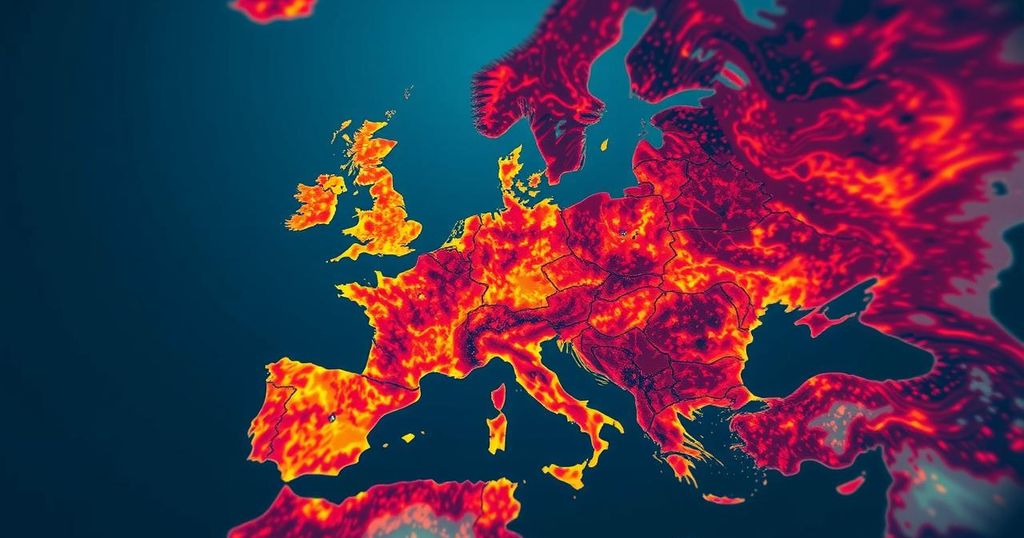A study reveals that climate change was responsible for over half of the 68,000 heat-related deaths in Europe during the summer of 2022. Researchers from the Barcelona Institute for Global Health estimate that approximately 38,000 lives could have been saved if greenhouse gas emissions had not increased global temperatures. The study highlights the demographic disparities in heat-related mortality and stresses the urgent need for public health strategies to address this escalating crisis.
A recent study conducted by researchers from the Barcelona Institute for Global Health (ISGlobal) reveals that climate change was responsible for over half of the 68,000 heat-related deaths during the exceptionally hot summer of 2022 in Europe. The research indicates that nearly 38,000 lives could have been spared had it not been for the atmospheric pollutants resulting from human activities that exacerbate the greenhouse effect, thereby leading to higher temperatures. This toll is starkly higher than the number of homicides recorded in Europe that same year. Thessa Beck, the lead author of the study, emphasized the immediacy of the issue, stating, “Many see climate change as a future concern. Yet our findings underscore that it is already a pressing issue.” The findings highlight demographic disparities, with older individuals, southern Europeans, and women facing the highest risks of heat-related mortality. While previous knowledge confirmed that carbon emissions intensified heatwaves, this study quantitatively assessed their contribution to the rising death toll. The investigation concluded that 56% of deaths attributable to heat could have been prevented if fossil fuel combustion and other destructive environmental practices had not altered the climate. This trend seems consistent, with similar percentages observed over the preceding six years. Emily Theokritoff, a researcher at Imperial College London who was not involved in the study, remarked on the health implications of increasing temperatures, noting that heat-related deaths escalated rapidly as temperature thresholds exceeded what populations could acclimatize to. The research underscores that Europe is warming at double the global rate, placing hospitals under strain as they prepare to address increasing climate-related health issues. With projections suggesting that deaths from extreme summer heat will soon outpace the lives saved by milder winters in a scenario where global temperatures exceed preindustrial levels by more than 2°C, the urgency is palpable. Last week, the United Nations Environment Programme warned that global temperatures are likely to rise by 3°C by century’s end. The issue of extreme heat presents severe challenges in regions such as Africa, Asia, and South America, where research has been limited due to inadequate data. Thessa Beck pointed out, “A common misconception is that only extreme temperatures pose a serious risk. However, our study, along with previous research, shows that even moderate heat can lead to heat-related deaths, particularly among more vulnerable populations.” Utilizing statistical modeling based on heat and health data from 35 European countries, the researchers projected mortality in a hypothetical world without anthropogenic climate effects, concluding that climate change accounted for 22,501 heat deaths in women and 14,026 in men. Garyfallos Konstantinoudis, also from Imperial College London, questioned the potential overestimation in mortality impact due to incomplete consideration of public health adaptations. To mitigate heat-related risks, healthcare professionals recommend hydration, staying indoors during peak temperatures, and ensuring the wellbeing of elderly individuals living alone. Governments are strongly advised to implement hot-weather action plans, develop urban spaces with ample greenery, and implement pollution reduction initiatives. Thessa Beck reiterated the health risks posed by heat, particularly for older adults, stating, “Heat can be very dangerous for the heart, especially for older people.”
The escalating climate crisis has profound implications for public health, particularly in Europe, which is experiencing accelerated warming compared to the global average. Research suggests that human activities, primarily fossil fuel combustion and land-use changes, are significantly contributing to this rapid climate change. Increased temperatures not only lead to uncomfortable heat but also pose direct health risks, manifesting in higher mortality rates during peak heat periods. Understanding the connection between climate change and health outcomes is critical, particularly as European healthcare systems prepare to grapple with the consequences of more frequent and severe heatwaves.
The findings from the study underscore the urgent health crisis driven by climate change, highlighting the necessity for immediate action to mitigate its impacts. Researchers affirm that a significant portion of heat-related mortality remains preventable through effective public health strategies and environmental reforms. Governments and healthcare providers must prioritize preventive measures and allocate resources to protect vulnerable populations from the harmful effects of climate change-related heat events.
Original Source: www.theguardian.com






